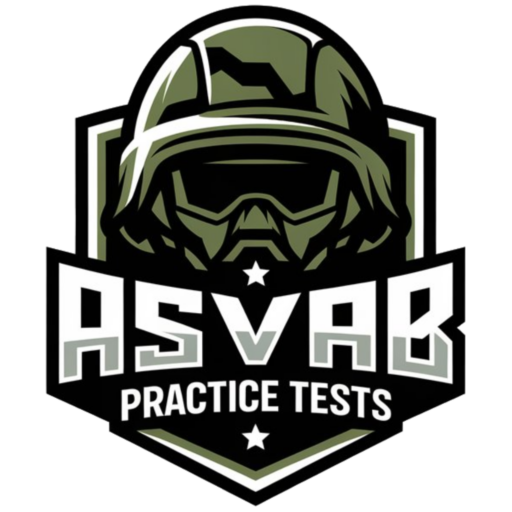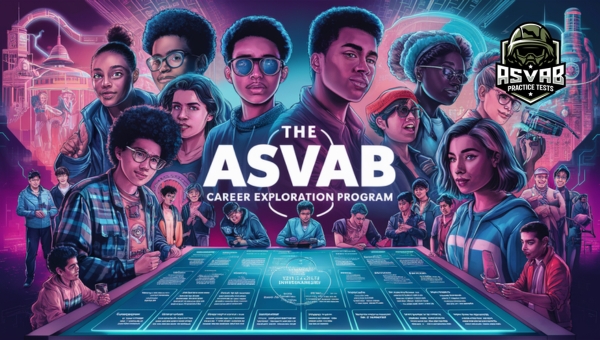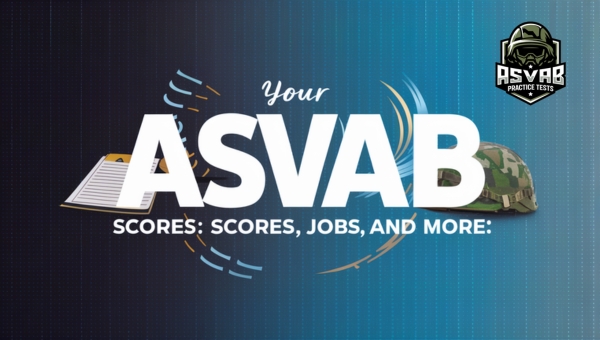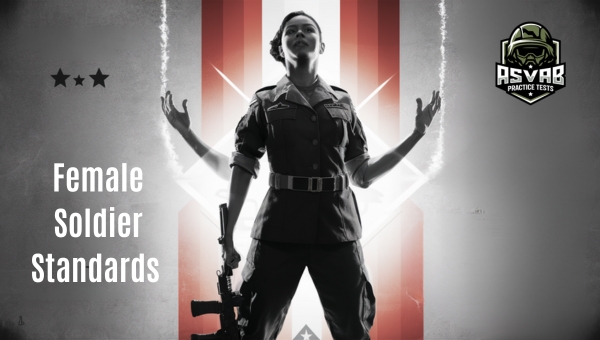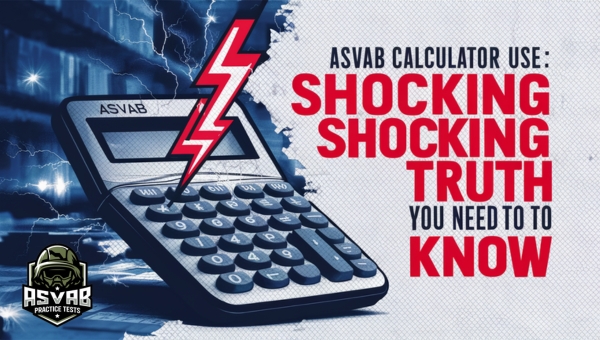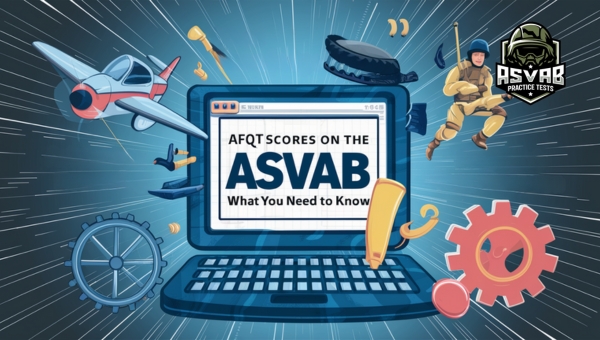Navy ASVAB Practice Test: Ace Your Exam with Confidence
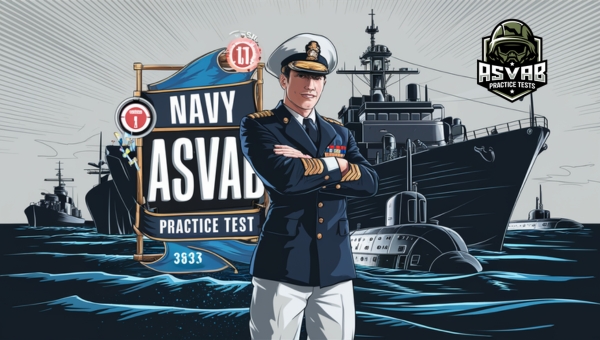
It may seem difficult to navigate the Navy ASVAB Practice Test, but don’t worry, we’ve got you covered. This tutorial will cover all the important features of the ASVAB, such as how practice exams can improve your score and how important it is for Navy recruitment.
By reading this, you’ll gain a comprehensive understanding of the scoring system, the benefits of practice tests, and the different types available. Whether you’re looking to boost your test scores, build confidence, or identify your strengths and weaknesses, this article offers valuable insights to help you succeed. Dive in and unlock your potential!
Breaking Down the ASVAB
The ASVAB is a crucial test for anyone looking to join the Navy. Understanding its importance and how to prepare can make a big difference in your results. Let’s break it down to see why it matters and how practice tests can help you succeed.
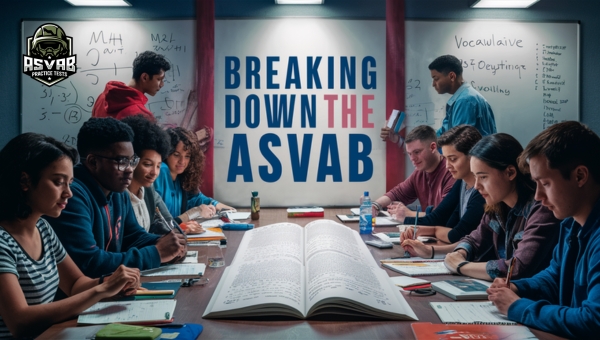
Importance of the ASVAB for Navy Recruits
The ASVAB, or Armed Services Vocational Aptitude Battery, plays a significant role in the Navy recruitment process.
Here’s why it’s essential:
- Assessing Aptitude: The ASVAB measures a candidate’s strengths and weaknesses across various subjects like math, science, and verbal skills. This helps determine which roles in the Navy you’re best suited for.
- Eligibility: Your ASVAB score is a key factor in deciding if you can enlist in the Navy. Each branch of the military has a minimum score requirement, and for the Navy, scoring well opens up more job opportunities.
- Career Placement: High scores can qualify you for more technical and specialized roles, which often come with better career advancement opportunities.
- Training Needs: The test results help the Navy tailor training programs to fit your skill levels, ensuring you get the support you need to succeed.
How Practice Tests Improve Performance?
Taking practice tests is a highly effective way to prepare for the ASVAB. Here’s how they can help:
- Familiarity with Test Format: Practice tests mimic the actual ASVAB, making you comfortable with the test structure and types of questions you’ll encounter.
- Time Management: Regular practice helps you manage your time efficiently during the test, ensuring you can complete all sections within the given time limits.
- Identifying Weak Areas: By taking practice tests, you can pinpoint which subjects you need to focus on, allowing you to study more effectively.
- Confidence Building: The more you practice, the more confident you become. This reduces test anxiety and helps you perform better on the actual exam.
Navy ASVAB Scoring System
Understanding how ASVAB scores are calculated and their importance can help you aim for the best results.
Here’s a detailed look at the scoring system:
- AFQT Score: The Armed Forces Qualification Test (AFQT) score is derived from four areas: Arithmetic Reasoning, Word Knowledge, Paragraph Comprehension, and Mathematics Knowledge. This score determines your overall eligibility to enlist.
- Composite Scores: These are also known as line scores and are calculated from different combinations of ASVAB subtests. Each Navy job has a specific composite score requirement.
- Scoring Range: ASVAB scores range from 1 to 99. A higher score means better job opportunities and eligibility for enlistment bonuses.
- Percentile Ranking: Your score is presented as a percentile ranking, comparing your performance with a norm group. For example, a score of 70 means you performed better than 70% of the norm group.
- Importance of High Scores: High scores not only increase your chances of getting into the Navy but also open doors to more advanced and specialized roles. This can significantly impact your career trajectory and benefits within the Navy.
Taking the time to understand and prepare for the ASVAB can make a significant difference in your journey to joining the Navy. Utilize practice tests to enhance your performance and aim for the best possible scores to unlock a wide range of opportunities.
Benefits of Navy ASVAB Practice Tests
Preparing for the Navy ASVAB can be a challenging journey, but practice tests offer significant advantages. By understanding how practice tests can help, candidates can maximize their chances of success. Let’s explore these benefits in more detail.
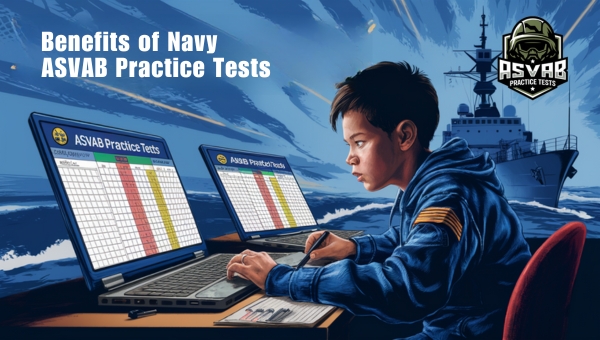
Enhancing Test Scores
Practice tests are an essential tool for improving overall ASVAB performance. Here’s how they help:
- Familiarity with Test Format: Practice tests mimic the actual ASVAB format, helping candidates become comfortable with the types of questions they will encounter.
- Time Management Skills: Regular practice helps candidates learn how to manage their time efficiently, ensuring they can complete each section within the allotted time.
- Retention of Information: Repeated exposure to test material aids in better retention and understanding of the concepts.
- Targeted Practice: By identifying specific areas where a candidate needs improvement, practice tests allow for focused study sessions that address weaknesses.
Building Confidence
Taking practice tests is an effective way to reduce test anxiety and build confidence. Here’s why:
- Reduced Anxiety: Familiarity with the test format and types of questions helps reduce the fear of the unknown, making the actual test day less stressful.
- Improved Self-Esteem: As candidates see their scores improve with practice, their self-esteem and confidence grow, which can positively impact their performance.
- Realistic Practice Environment: Simulating the test environment helps candidates get used to the pressure and conditions of the actual ASVAB, leading to better performance on test day.
Understanding Strengths and Weaknesses
Practice tests are invaluable for highlighting areas that need improvement before taking the actual ASVAB.
Here’s how they assist in this regard:
- Performance Analysis: Detailed reports from practice tests show which sections a candidate excels in and which areas need more work.
- Targeted Study Plans: Based on the analysis, candidates can create focused study plans that concentrate on improving weak areas while maintaining strengths.
- Progress Tracking: Regularly taking practice tests allows candidates to track their progress over time, providing a clear picture of their improvement and readiness for the actual test.
- Customized Feedback: Many practice tests offer feedback on incorrect answers, helping candidates understand their mistakes and learn the correct information.
By incorporating practice tests into their study routine, Navy ASVAB candidates can significantly enhance their preparation, boost their confidence, and gain a clearer understanding of their strengths and weaknesses.
This comprehensive approach ensures they are well-prepared for the actual test, increasing their chances of achieving a high score and securing their desired Navy career.
Types of Navy ASVAB Practice Tests
When preparing for the Navy ASVAB, practice tests are invaluable tools. They come in various forms, each designed to help you get familiar with the exam format and question types. Let’s delve into the different types of Navy ASVAB practice tests available, ensuring you make the most of your study sessions.
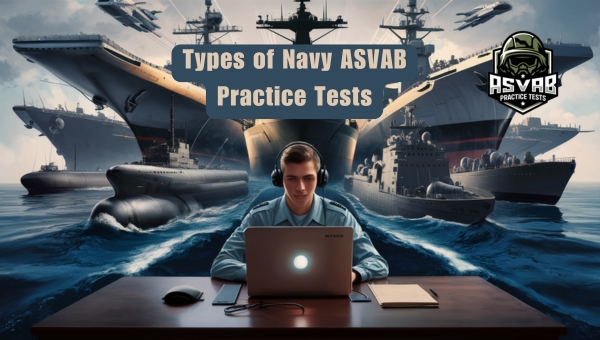
Full-Length Practice Tests
Full-length practice tests replicate the actual ASVAB in terms of format, length, and timing. These tests typically contain all the subtests you’ll face on the actual exam, including:
- Arithmetic Reasoning (AR)
- Word Knowledge (WK)
- Paragraph Comprehension (PC)
- Mathematics Knowledge (MK)
- General Science (GS)
- Electronics Information (EI)
- Auto and Shop Information (AS)
- Mechanical Comprehension (MC)
- Assembling Objects (AO)
Taking these comprehensive tests helps you build stamina and get used to the timing constraints of the real ASVAB.
Sectional Practice Tests
Sectional practice tests focus on individual subtests of the ASVAB. These are particularly useful if you need to improve specific areas. For instance, if you struggle with Mathematics Knowledge or Word Knowledge, you can take dedicated practice tests for these sections.
This targeted approach allows you to hone in on weaknesses without the pressure of completing a full-length test.
Timed Practice Tests
Timed practice tests are essential for managing the time pressure of the ASVAB. Each subtest has a strict time limit, and these practice tests simulate that environment.
They help you develop a sense of pacing, ensuring you can complete all questions within the allotted time. Timed tests are available for both full-length and sectional practice tests.
Untimed Practice Tests
Untimed practice tests remove the pressure of time constraints, allowing you to focus solely on understanding the material and improving accuracy.
These tests are excellent for initial preparation phases when you are still getting comfortable with the content. They give you the freedom to think through each question without the added stress of a ticking clock.
Online Practice Tests
Online practice tests offer convenience and accessibility. Many websites provide interactive ASVAB practice tests that you can take anywhere, anytime.
Some features of online practice tests include:
- Instant feedback on answers
- Performance tracking
- Adaptive question difficulty
- Explanations for correct and incorrect answers
These features help you understand your mistakes and learn from them quickly.
Printable Practice Tests
For those who prefer a traditional study method, printable practice tests are available. These tests can be printed out and taken in a quiet study environment. They are useful for simulating the test-taking conditions you may encounter at a testing center.
Adaptive Practice Tests
Adaptive practice tests adjust their difficulty based on your performance. If you answer a question correctly, the next question will be slightly harder. Conversely, if you answer incorrectly, the next question will be easier.
This type of test mimics the adaptive nature of the computerized ASVAB and helps you become comfortable with varying difficulty levels.
By utilizing these different types of practice tests, you’ll be better prepared for the Navy ASVAB. Each type has its unique benefits and can be used strategically to improve your overall performance.
Whether you need to work on specific areas, manage your time better, or build your test-taking stamina, there’s a practice test that fits your needs.
Navy Jobs & ASVAB Scores
Here is a table for the Navy Jobs and ASVAB Scores:
| Rating | Navy Rating Title | Minimum ASVAB Subset Scores |
|---|---|---|
| ABE | Aviation Boatswain’s Mate – Equipment | AR+MC+AS=130 |
| ABF | Aviation Boatswain’s Mate – Fuels | AR+MC+AS=130 |
| ABH | Aviation Boatswain’s Mate – Handling | AR+MC+AS=130 |
| AC | Air Traffic Controlman | AR+2MK+GS=210 |
| AD | Aviation Machinist Mate | AR+MK+EI+GS=190 |
| AE | Aviation Electronics Mate | AR+MK+EI+GS=218 |
| AG | Aviation Aerographer’s Mate | VE+MK+GS=165 |
| AK | Aviation Storekeeper | VE+AR=103 |
| AME | Aviation Structural Mechanic – Equipment | AR+MC+AS=164 |
| AMH | Aviation Structural Mechanic – Hydraulics | AR+MC+AS=164 |
| AMS | Aviation Structural Mechanic – Structures | AR+MC+AS=164 |
| AO | Aviation Ordnanceman | AR+MK+EI+GS=190 |
| AS | Aviation Support Equipment Technician | AR+2MK+GS=200 |
| AT | Aviation Electronics Technician | AR+MK+EI+GS=218 and MK+EI+GS=156 |
| AW | Aviation Antisubmarine Warfare Technician | AR+2MK+GS=196 |
| AZ | Aviation Maintenance Administrationman | VE+AR=103 |
| BM | Boatswain’s Mate | N/A |
| BU | Builder | AR+MC+AS=140 |
| CE | Construction Electrician | AR+MK+EI+GS=200 |
| CM | Construction Mechanic | AR+MC+AS=158 |
| CTA | Cryptologic Technician – Administration | VE+MK=105 |
| CTI | Cryptologic Technician – Interperative | VE+MK+GS=150 |
| CTM | Cryptologic Technician – Maintenance | MK+EI+GS+AR=218, MK+EI+GS=156, MK=57 and AR=57 |
| CTO | Cryptologic Technician – Communications | VE+AR=103 |
| CTR | Cryptologic Technician – Collection | VE+AR=110 |
| CTT | Cryptologic Technician – Technical | VE+MK+GS=165 |
| DC | Damage Controlman | VE+MC+AS=158 |
| DK | Disbursing Clerk | VE+AR=105 |
| DM | Draftsman | N/A |
| DT | Dental Technician | VE+MK+GS=149 and VE+MK+CS=153 |
| EA | Engineering Aid | AR+2MK+GS=210 |
| EM | Electricians Mate | AR+2MK+GS=196 |
| EN | Engineman | MK+AS=96 |
| EO | Equipment Operator | AR+MK+EI+GS=204 |
| ET | Electronics Technician | AR+MK+EI+GS=218 and MK+EI+GS=156, MK=57 and AR=57 |
| FC | Fire Controlman | AR+MK+EI+GS=218 and MK+EI+GS=156, MK=57 and AR=57 |
| GM | Gunner’s Mate | AR+MK+EI+GS=204 |
| HM | Hospital Corpsman | VE+MK+GS=149 |
| HT | Hull Technician | VE+MC+AS=158 |
| IC | Interior Communicationman | AR+MK+EI+GS=212 |
| IT | Information System Technician | VE+MK+CS=163 or VE+MK=110 |
| MA | Master at Arms | WK+AR=100: Minimum WK=45 |
| MM | Machinist Mate | MK+AS=96 |
| MN | Mineman | VE+MC+AS=158 |
| MR | Machinery Repairman | AR+MC+AS=158 |
| MT | Missile Technician (Advanced Electronics Field) | AR+MK+EI+GS=222 or VE+AR+MK+MC=222 |
| OS | Operations Specialist | VE+MK+CS=157 or AR+2MK+GS=210 |
| PR | Aircrew Survival Equipmentman | VE+MC+AS=158 |
| YN | Yeoman | VE+MK=105 or VE+MK=CS=157 |
Conclusion
Preparing for the Navy ASVAB is essential for any hopeful recruit. Utilizing Navy ASVAB practice tests can significantly improve test scores, build confidence, and help candidates understand their strengths and weaknesses.
By incorporating these practice tests into your study routine, you can ensure you are well-prepared for the actual exam, thus increasing your chances of achieving your desired Navy career.
Stay informed and continue exploring our blog for more insightful tips and guides to help you on your journey. Dive into our other posts to unlock more valuable resources!
